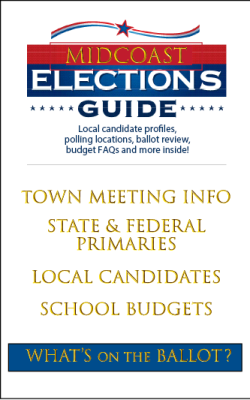EcoMaine rebuts solid waste assertions
In reference to the opinion piece you ran on Monday, May 23, titled "Don't burn your trash. We can do better," we would like to take a moment to correct some misinformation published about ecomaine.
First, we want to acknowledge our full alignment with this important statement in the concerned citizen's letter: "Where we should be focusing our energy is on reducing what goes into our landfill." As a community-owned nonprofit and pioneer of single-sort recycling in the state of Maine, we have two leading priorities: to support landfill diversion and to do so in the most economically and environmentally sustainable way we can for our member communities. To that end, there were a number of inaccurate statements in the letter that we would like to correct:
1. The article claims that waste-to-energy facilities (which the citizen calls "incinerators") are a thing of the past. In fact, waste-to-energy (WTE) remains a very viable and preferred waste management strategy. Waste-to-energy plants continue to be the primary municipal solid waste (MSW) management tool in Europe, with 452 plants in operation there. It also remains very viable here in North America, with 77 plants in operations. Palm Beach County, one of the fastest growing communities in the country, has recently invested hundreds of millions of dollars in waste-to-energy (the same technology ecomaine employs) after a lengthy feasibility study identified this as the most sustainable path forward for the community. Durham, Ontario has also built a new waste-to-energy facility. With two new waste-to-energy plants coming online this year alone, it's not accurate to say that waste-to-energy is a thing of the past.
2. Along similar lines, the citizen also published a link to a 2011 ecocycle article that claimed that WTE poses an unjustified financial risk, stops all future recycling and composting growth, and poses health and environmental risks. Landfilling is a short-term solution while an ashfill will accommodate the waste disposal needs of WTE communities well into the future. Research such as this report [http://www.wiwmd.org/documents/Recycling_and_Waste_to_Energy-Are_They_Co... by Eileen Brettler Berenyi, PhD, concludes that communities that promote waste-to-energy with Recycling Centers result in increased recycling rates. Rigorous monitoring programs in our WTE facility demonstrate no detrimental effect on neighbors' health or on the environment.
3. The citizen also misquoted several figures relating to: fee structures for our recycling program; the tonnage of waste that we receive; and our cash reserves. We'll start with municipal waste tonnage. The 181,000 tons of waste that we process annually is best characterized in three groupings which each comprise roughly a third of our tonnage: (1) contracted household waste, (2) contracted commercial waste, which is committed to us through flow ordinances in our member communities, and (3) un-contracted spot market waste. Over the last 10 years, we have reduced the overall waste tonnage from our member communities by 25 percent through partnerships and education that promote the waste hierarchy, through successful reduction, reuse, recycling and the recovery of organic waste materials. We are seeking more contracted communities to maximize the capacity of both our waste-to-energy and recycling facilities for our member communities because the spot market tonnage comes and goes with no guarantee of long-term commitment. As for recycling rates, it is false to claim that contract member communities are subsidizing the owner communities in any way because all communities pay at some point to recycle when markets can't support the cost to recycle. If commodity prices for recyclables we sell on the market cannot cover our operating expenses, we charge all members. We offer this revenue and cost sharing plan because it's the fairest way to do business when markets are strong and we share in the costs to recycle when markets are weak. Lastly, the citizen made an inaccurate correlation between our $3 million decline in our cash reserves and the commodities market. In fact, we intentionally reduced our cash reserves to pay off our debt and drop our annual assessments to our member communities to provide them with the financial relief they were looking for, as covered in this news article. [http://www.pressherald.com/2012/04/24/ecomaine-to-pay-off-debt-early-low... ]
4. We would also like to comment on the references to of what ecomaine is sending to our landfill. Indeed, ecomaine stands by the measurement of volume vs. weight in terms of what we put into our landfill with good reason. Volume is what fills landfills more quickly. If you take Styrofoam, for example, the weight of a pool-sized quantity makes no difference to how fast voluminous quantities of Styrofoam will fill that pool, despite the weight being so little. By reducing the volume of our trash by 90 percent while converting it to stabilized ash before storing it in our landfill means, we fill our landfill at approximately 1/10th of the pace those that landfill raw waste.
5. Lastly, the citizen made a reference to only two of a wide variety of programs and tactics we offer through our education and outreach programming. Recycling right and how to compost have indeed been key focus areas at the request of the schools that we support. But our program is more broadly designed directly in line with the Maine Department of Environmental Protection's waste management hierarchy, encouraging member communities to reduce and reuse before recycling or composting. We directly engage 8,000 community members through events, presentations and waste characterization studies, and on-site WTE & recycling center tours each year. We reach tens of thousands more through television and radio ads, our website and social media education campaigns. We award $20,000 in school recycling grants annually, plus eco-Excellence Awards to inspire continuous improvement among member communities. Furthermore, we employ a full-time education program manager in addition to a communications manager to ensure our commitment to education and outreach is realized.
Thank you for this opportunity to speak on behalf of the services and programs we are proud to offer to Maine communities.
Lisa Wolff is communications manager for EcoMaine.






























